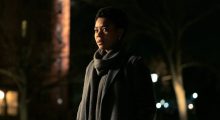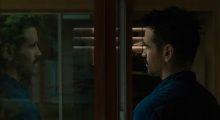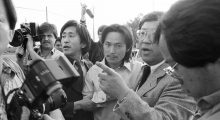Sundance
-
“The Experimental Works I Was Already Creating Had Huge Potential to Invent a New Form of Immersive Global Filmmaking” | Joe Hunting, We Met in Virtual Reality

The last two years have prompted much contemplation and reconsideration of the reasons why we make our films as well as the ways in which we make them. What aspect of your filmmaking—whether in your creative process, the way you finance your films, your production methodology or the way you relate to your audience—did you have to reinvent in order to make and complete the film you are bringing to the festival this year? I began my filmmaking journey inside social VR during the fall of 2018, not foreseeing how valuable that endeavor would be. When the pandemic hit, it […]
by Filmmaker Staff on Jan 21, 2022 -
“We Find the Authenticity of Real Locations to Be Such a Huge Factor in Making a Believable and Captivating Movie”: DP Benjamin Kirk on Watcher

-
“Consideration of Our Own Mortality Provides Our Work With Urgency and Focus” | Phyllis Nagy, Call Jane


The last two years have prompted much contemplation and reconsideration of the reasons why we make our films as well as the ways in which we make them. What aspect of your filmmaking—whether in your creative process, the way you finance your films, your production methodology or the way you relate to your audience—did you have to reinvent in order to make and complete the film you are bringing to the festival this year? The pandemic served as a potent reminder that a consideration of our own mortality provides our work with urgency and focus—and with a decidedly necessary dark […]
by Filmmaker Staff on Jan 21, 2022 -
Sundance 2022 Critic’s Notebook: When You Finish Saving the World


I eased into the opening hours of my second virtual Sundance Film Festival better prepared than at this time last year. The festival, of necessity, pivoted back to online-only mode with so little heads-up time that seasonal staffers evidently learned they were out of gigs at the same time everyone else on Twitter heard about the change of plans—financially devastating for the suddenly unemployed and uncompensated, very regrettable for filmmakers, logistically fairly easy to adjust to for everyone else after a few years’ virtual fest training. This time last year I had a projector, but also roommates and hence the […]
by Vadim Rizov on Jan 21, 2022 -
“The Pandemic Just Exaggerates All the Issues You Already Face in Production to an Almost Comedic Level” | Chloe Okuno, Watcher



The last two years have prompted much contemplation and reconsideration of the reasons why we make our films as well as the ways in which we make them. What aspect of your filmmaking—whether in your creative process, the way you finance your films, your production methodology or the way you relate to your audience—did you have to reinvent in order to make and complete the film you are bringing to the festival this year? Personally, I feel that the pandemic just exaggerates all the issues you already face in production to an almost comedic level… you have to laugh so […]
by Filmmaker Staff on Jan 21, 2022 -
“This Was the First Film I’ve Ever Made Where Every Day of Shooting Started With Dread” | Oliver Hermanus, Living


The last two years have prompted much contemplation and reconsideration of the reasons why we make our films as well as the ways in which we make them. What aspect of your filmmaking—whether in your creative process, the way you finance your films, your production methodology or the way you relate to your audience—did you have to reinvent in order to make and complete the film you are bringing to the festival this year? Having shot a film as vaccinations rolled out in the United Kingdom, and knowing that our project could be doomed if we had an outbreak of […]
by Filmmaker Staff on Jan 21, 2022 -
“Even if You Are Cutting a More Commercial Film, the Inspiration You Can Find From Obscure Films Is Endless”: Editors Jennifer Lee and Maya Maffioli on Master


Master, the debut feature by Mariama Diallo, takes place at the fictional Ancaster College, situated on land once occupied by gallows poles during the Salem witch trials. Blending horror and thriller elements with a critique of racism and privilege, the film follows numerous characters as the college’s façade of gentility begins to unravel. Mixing genres and following a large group of characters means the film could have gone in numerous directions, and editors Jennifer Lee and Maya Maffioli discuss the various incarnations the film assumed throughout the editing process. Filmmaker: How and why did you wind up being the editor […]
by Filmmaker Staff on Jan 21, 2022 -
“You Have to Become Vulnerable With Your Director Before You Can Go On Set”: DP Benjamin Loeb on After Yang


Like Columbus before it, Kogonada’s After Yang tackles its heady subject matter—including, in this case, a climate catastrophe and existential questions about the nature of humanity and memory that arise from its sci-fi setting—only obliquely, through composition and framing. Cinematographer Benjamin Loeb explained the significance of emptiness and space to cinema and the love he and Kogonada share for Ozu. Filmmaker: How and why did you wind up being the cinematographer of your film? What were the factors and attributes that led to your being hired for this job? Loeb: Honestly, I believe I was the unicorn of the interviews and came in very […]
by Filmmaker Staff on Jan 21, 2022 -
“We Started to Realize That Our Film Connects to the Current Moment in a Powerful and Urgent Way” | Julie Ha & Eugene Yi, Free Chol Soo Lee



The last two years have prompted much contemplation and reconsideration of the reasons why we make our films as well as the ways in which we make them. What aspect of your filmmaking—whether in your creative process, the way you finance your films, your production methodology or the way you relate to your audience—did you have to reinvent in order to make and complete the film you are bringing to the festival this year? We always knew our film would tell the story of how one Asian-American’s life was shaped by racism in the second half of the 20th century. […]
by Filmmaker Staff on Jan 21, 2022 -
“Given Enough Time and Space, Any Difficult Scene Can Be Solved”: Editors Jean Tsien and Aldo Velasco on Free Chol Soo Lee



With Free Chol Soo Lee, directors Julie Ha and Eugene Yi examine the life and legacy of Chol Soo Lee, a Korean immigrant wrongfully convicted of committing a murder in San Francisco’s Chinatown at the age of 20 due to the false testimony of white tourists. When journalist K.W. Lee took an interest in Lee’s case, it spearheaded a wave of nation-wide pan-Asian activism. Editors Jean Tsien and Aldo Velasco and co-editor Anita Yu discuss how their understanding of their subject grew over time and how they ultimately decided to zero in on the film’s narrative trajectory. Filmmaker: How and why […]
by Filmmaker Staff on Jan 21, 2022

